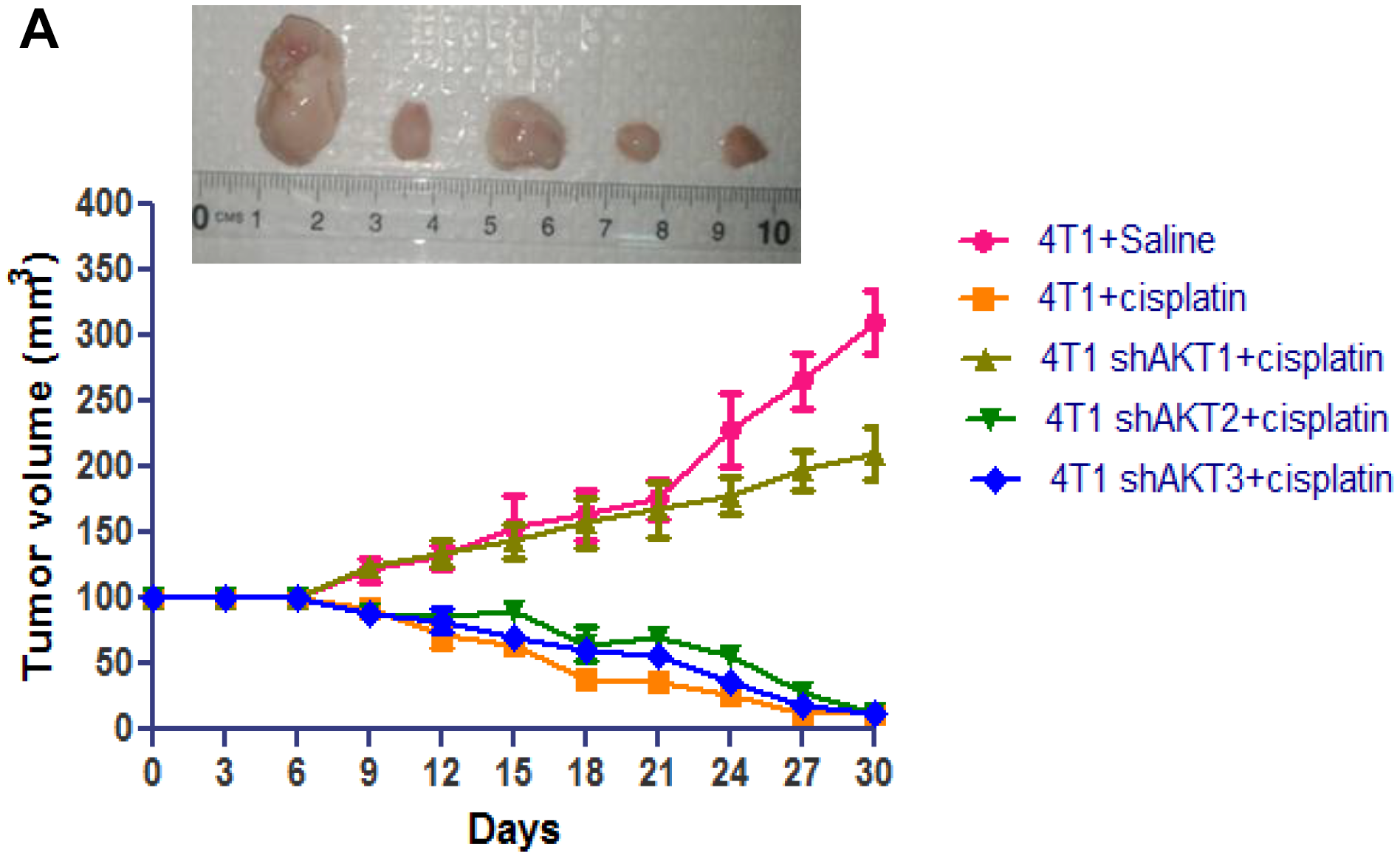Oncotarget: AKT isoforms have discrete expression in triple negative breast cancers
FOR IMMEDIATE RELEASE
2020-11-10
Oncotarget recently published "AKT isoforms have discrete expression in triple negative breast cancers and roles in cisplatin sensitivity" which reported that the authors investigated the expression and net effect of the individual isoforms in triple negative breast cancers and response to cisplatin treatment using cellular, mice models and clinical samples.
Interestingly, analysis of the expressions of AKT isoforms in clinical samples showed relatively higher expression of AKT1 in primary tissues; whereas lung and liver metastatic samples showed elevated expression of AKT2.
Similarly, triple-negative breast cancer cell lines, BT-549 and MDA-MB-231, with high proliferative and invasive properties, displayed higher expression levels of AKT1/2. By modulating AKT isoform expression in MCF-10A and BT-549 cell lines, the Oncotarget authors found that the presence of AKT2 was associated with invasiveness, stemness and sensitivity to drug treatment.
It was further demonstrated that loss of function of AKT1 isoform is associated with reduced sensitivity towards cisplatin treatment in triple-negative breast cancers cellular and syngeneic mice models.
The decrease in cisplatin treatment response in shAKT1 cells was allied with the upregulation in the expression of transporter protein ABCG2, whereas silencing of ABCG2 restored cisplatin sensitivity in these cells through AKT/SNAIL/ABCG2 axis.
In conclusion, the Oncotarget study demonstrated the varied expression of AKT isoforms in triple-negative breast cancers and also confirmed the differential role of isoforms in stemness, invasiveness and response towards the cisplatin treatment.
"The Oncotarget study demonstrated the varied expression of AKT isoforms in triple-negative breast cancers."
Dr. Fayaz Malik from The Academy of Scientific and Innovative Research as well as The CSIR-Indian Institute of Integrative Medicine said, "Breast cancer is the second-most lethal cancer in women around the world."
Their team explored cisplatin resistance via AKT2 and AKT3 isoforms that lead to malignant human uterine cancer cells.
Nevertheless, to understand the significance of the outcomes driven by the AKT isoforms, in respect to normal versus malignant breast cancer it is important to characterize which AKT isoform leads to oncogenesis, or exerts self-contradictory effects, both promoting and impeding neoplastic phenotypes.
Therefore, the authors sought to determine the isoform-specific functions of AKT in triple-negative breast cancers.

Figure 8: Down-regulation of AKT2 decreases tumorigenic capacity (A) Tumorigenic capacity in vivo. 1 × 106 cells were injected into the right flank of female Balb/c mice. Representative photo shows differential volume of tumor at 30 days after cisplatin treatment and tumor burden was assessed after every 3 days in injected animals, for a total of 30 days. Error bars represent mean ± S. D. versus control.
To this end, they modulated AKT isoform expression in human mammary nonmalignant immortalized cell line, MCF-10A and malignant breast cancer cell line, BT-549 by knocking down endogeneous AKT isoforms using short hairpin RNA.
Interestingly, analysis of triple-negative breast clinical samples from primary and metastatic sites have shown differential expression of AKT isoforms. These studies, highlight the role of specific AKT isoforms in invasiveness and poor response to cisplatin treatment in Triple-negative breast cancers that needs to be evaluated further for the development of isoform specific inhibitors for better clinical outcome.
The Malik Research Team concluded in their Oncotarget Research Paper that the present work elucidated expressions of AKT isoforms varies in primary and secondary sites of TNBCs, which needs to be further validated by taking large sample sizes.
These studies unraveled the specific roles of AKT isoforms in stemness, invasion and therapeutic response of cisplatin in TNBCs, therefore suggesting that it is imperative to precisely design isoform specific inhibitors in the treatment of aggressive triple-negative breast cancers.
Sign up for free Altmetric alerts about this article
DOI - https://doi.org/10.18632/oncotarget.27746
Full text - https://www.oncotarget.com/article/27746/text/
Correspondence to - Fayaz Malik - fmalik@iiim.ac.in
Keywords - AKT isoform, CSCs, ABCG2, drug resistance, TNBCs
About Oncotarget
Oncotarget is a biweekly, peer-reviewed, open access biomedical journal covering research on all aspects of oncology.
To learn more about Oncotarget, please visit https://www.oncotarget.com or connect with:
SoundCloud - https://soundcloud.com/oncotarget
Facebook - https://www.facebook.com/Oncotarget/
Twitter - https://twitter.com/oncotarget
LinkedIn - https://www.linkedin.com/company/oncotarget
Pinterest - https://www.pinterest.com/oncotarget/
Reddit - https://www.reddit.com/user/Oncotarget/
Oncotarget is published by Impact Journals, LLC please visit http://www.ImpactJournals.com or connect with @ImpactJrnls
Media Contact
MEDIA@IMPACTJOURNALS.COM
18009220957x105
Copyright © 2025 Rapamycin Press LLC dba Impact Journals



